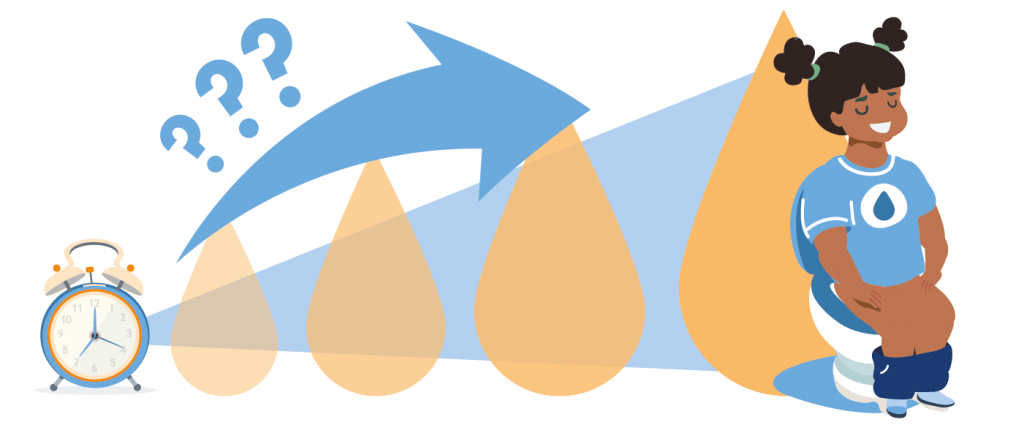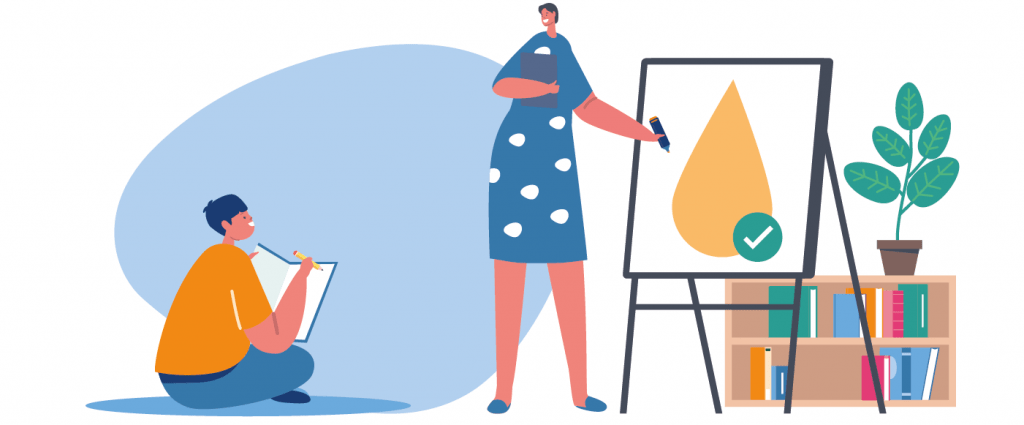Why is my toddler peeing a lot all of a sudden?
As a parent, we notice toddlers pee often (especially on long car journeys or during a nappy change…), but you might be concerned if they start peeing a lot more all of a sudden. In this article, we’ve gathered the potential causes and management options for increased urination in toddlers.
iD always recommends you speak to your doctor if you have any concerns about your child’s health.

What causes a toddler to pee a lot all of a sudden?

As a parent, you know what’s normal for your toddler in terms of urination. Moreover, a frequent need to urinate is common in young children, as their bladders are smaller than adults’1. Additionally, there are non-medical reasons your toddler might suddenly pee a lot, including:
- they’re feeling nervous about something
- they’ve just drunk a lot of fluid
- they’ve simply formed a habitof weeing often2.
If your toddler is experiencing leaks in addition to peeing a lot out of the blue, you could try iD Comfy Junior Pants. These super-soft, absorbent pants are comfortable and wick away moisture quickly and securely. The discreet, underwear-like design means your little one will feel like they’re wearing big-kid pants – perfect as a potty training aid.
However, though rare, increased urination in a toddler could indicate an underlying medical condition, such as:
- an allergy
- abnormal structure of the bladder and/or urethra
- constipation
- obstructive sleep apnoea3
- a urinary tract infection (UTI)4
- diabetes5
- voiding dysfunction, where your little one has difficulty fully emptying their bladder6.
Another possible reason your toddler has started peeing a lot all of a sudden could be pollakiuria7.
Pollakiuria
Pollakiuria refers to frequent daytime urination in children (not bedwetting) with no specific cause8. It’s a benign condition9, meaning that it’s not harmful. However, we realise it’s not always easy to cope with.
The most obvious symptom is that your child needs to wee significantly more during the day than is considered typical but doesn’t wet themselves10. Normally, they only pass small amounts of urine.11 Moreover, a child with pollakiuria will wee three to four times an hour or up to 40 times per day.12 Pollakiuria isn’t usually associated with other symptoms, so if your toddler has any of the following symptoms, it’s worth talking to your doctor:
- pain while they wee
- frequently passing larger amounts of urine
- drinking a lot of fluid
- urinary incontinence or ‘accidents’
- changes in bowel movements
- weeing lots at night
- a raised temperature.13
While many children have pollakiuria without an underlying cause, you may find certain triggers or stressors cause the condition. These could include emotional or social stressors, such as bullying, changes to the composition of their urine or being particularly sensitive to cold weather.14

How you can help your toddler manage their symptoms
Once you’ve ruled out any medical condition that could be causing your toddler to urinate a lot unexpectedly, you can think about management options. These include:
- distracting your toddler from the urge to wee with a small, fun task or chore, or by engaging them in their favourite activity
- avoiding commenting on how much your little one is urinating as this only increases their awareness of the issue and can cause anxiety15
- if your child has a UTI or an overactive bladder, a doctor can advise you on appropriate medication16
- scheduling times to wee to encourage them to retrain their bladder
- avoiding caffeine (present in foods such as chocolate), as this can irritate the bladder
- encouraging your toddler to take their time and fully relax their muscles17
- ensuring your little one has enough time to relax and have fun during the day
- avoiding punishing them for urinating frequently
- avoiding bubble baths, as this can irritate the opening of the urinary tract18
- encouraging your child to sit (or stand) comfortably when they pee, as this helps them to empty their bladder fully
- making sure they drink enough water
- preventing or treating constipation with fibrous foods, such as fruit and vegetables19.
iD is here to help; if you’d like more advice, why not check out our junior-oriented blog posts where we write about various subjects related to bladder health. Also check out our Comfy Pants page for more information!

Sources
1 “Urinary Problems and Injuries, Age 11 and Younger”, Healthwise Staff, 26 February 2020, Source: https://www.uofmhealth.org/health-library/urin3
2 Ibid.
3 “Overactive Bladder in Children”, WebMD, 20 May 2021, Source: https://www.webmd.com/urinary-incontinence-oab/overactive-bladder-in-children
4 “Urinary Frequency”, Children’s Hospital of Philadelphia, May 2011, Source: https://www.chop.edu/conditions-diseases/urinary-frequency
5 “Type 1 diabetes”, SickKids Staff, 17 October 2016, Source: https://www.aboutkidshealth.ca/Article?contentid=1719&language=English
6 “6 Signs Your Child May Have Bladder Dysfunction”, Seth Alpert, 22 June 2016, Source: https://www.nationwidechildrens.org/family-resources-education/700childrens/2016/06/6-signs-your-child-may-have-bladder-dysfunction
7 “What Causes Pollakiuria and How Is It Treated?”, Tim Jewell, 29 September 2018, Source: https://www.healthline.com/health/pollakiuria
8 Ibid.
9 “Bladder and voiding problems in children”, NHS, 2 August 2021, Source: https://www.cuh.nhs.uk/patient-information/bladder-and-voiding-problems-in-children/
10 “What Causes Pollakiuria and How Is It Treated?”, Tim Jewell, 29 September 2018, Source: https://www.healthline.com/health/pollakiuria
11 Ibid.
12 “Pollakiuria: Everything you need to know”, Jenna Fletcher, 27 February 2020, Source: https://www.medicalnewstoday.com/articles/pollakiuria
13 Ibid.
14 “What Causes Pollakiuria and How Is It Treated?”, Tim Jewell, 29 September 2018, Source: https://www.healthline.com/health/pollakiuria
15 Ibid.
16 “Urinary Frequency”, Children’s Hospital of Philadelphia, May 2011, Source: https://www.chop.edu/conditions-diseases/urinary-frequency
17 “Overactive Bladder in Children”, WebMD, 20 May 2021, Source: https://www.webmd.com/urinary-incontinence-oab/overactive-bladder-in-children
18 “Why Does My Child Always Need to Go to the Bathroom?”, Cindy Gellner, 25 May 2018, Source: https://healthcare.utah.edu/the-scope/shows.php?shows=0_oj2ugrvb
19 “Bladder and voiding problems in children”, NHS, 2 August 2021, Source: https://www.cuh.nhs.uk/patient-information/bladder-and-voiding-problems-in-children/
